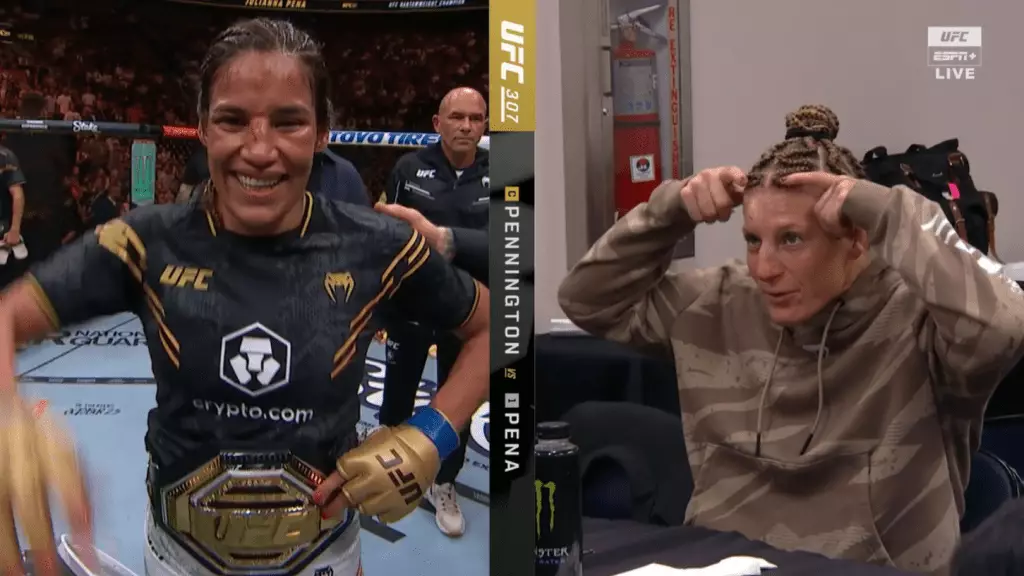UFC events often culminate in moments that reverberate through the sports world, but none perhaps quite as provoking as the post-fight call-outs made by fighters. At UFC 307, Julianna Peña’s immediate call-out of Amanda Nunes following her split decision victory over Raquel Pennington sparked a wave of discussion. Was this a genuine challenge, or merely a strategic maneuver in the landscape of mixed martial arts (MMA)? In dissecting this moment, we delve into the implications of Peña’s choice, the reactions it ignited, and the larger narratives at play in women’s MMA.
The Context of Julianna Peña’s Victory
Peña, known as “The Venezuelan Vixen,” emerged victorious after a tightly contested match that left many observers questioning the scoring. Her title win was a crucial moment not only for her career but also for the women’s bantamweight division, which had been dominated by Nunes. However, the immediate aftermath saw Peña redirect the spotlight towards a retired fighter instead of emphasizing a potential title defense against a legitimate contender. This unusual choice raises questions about Peña’s intentions and her grasp of the strategic elements of fighter promotion.
With Kayla Harrison, an Olympic gold medalist and formidable fighter, positioned as a potential title challenger, Peña had the opportunity to draw attention to a compelling matchup. Harrison had made her own statement by winning her fight on the main card, dominating her opponent and establishing her credentials in the UFC. An enthusiastic call-out of Harrison could have bolstered Peña’s image as the reigning champion eager to face formidable competition. Instead, Peña’s call-out of the seemingly absent Nunes diverted attention from an immediate rivalry that would engage fans and possibly result in a more dynamic fight.
UFC analyst Chael Sonnen’s reaction to Peña’s comments on the post-fight show encapsulates the mixed feelings surrounding the call-out. Sonnen characterized the moment as a “troll job,” suggesting that it was a calculated maneuver rather than a sincere demand for a rematch. His interpretation highlights the notion that fighters often use strategic psychologies to play with narratives, media perceptions, and opponent dynamics. Sonnen’s comparison to Sean O’Malley’s call-out of Ilia Topuria illustrates that such tactics are not uncommon; fighters frequently attempt to misdirect potential challengers or maintain leverage in their promotional opportunities.
Sonnen emphasized that the division’s competitive landscape is wide open but also marred by the reality of potential match-making misfires. Calling out a former champion who has announced her retirement not only deflects from current challengers like Harrison and Pennington but also showcases how the fight promotion game can be wielded to manipulate public interest, even if it strays from traditional competitive integrity.
The Reaction of the MMA Community
The MMA community is often polarized by these call-outs, and Peña’s decision was met with mixed reactions. The split-screen display of Kayla Harrison’s reaction—gesturing that Peña was avoiding confrontation—underscores a truth within the sport; fighters are continually evaluating their adversaries’ intentions. Many fans and analysts expressed disappointment, hoping Peña would present a bold challenge to someone actively fighting rather than relying on the nostalgia of Nunes’ legacy.
Additionally, it is essential to contemplate the long-term implications of Peña’s choices. By not pursuing a fight with Harrison, she risks losing momentum and credibility within a division that thrives on fresh rivalries and action-packed bouts. Harrison represents the future of women’s MMA, having garnered significant attention post-victory, and neglecting that narrative for a nostalgic nod to Nunes may not render the favorable reception Peña aims for.
As Julianna Peña grapples with her next strategic move, the landscape of women’s bantamweight MMA hangs in a delicate balance. Recent developments posit Peña at a crossroads: she could either embrace her role as champion by confronting challengers actively participating in the sport or become ensnared in the web of bygone super-fights that no longer hold relevance. The decision stands to shape both her legacy and the future trajectory of the bantamweight division.
Julianna Peña’s post-fight call-out of Amanda Nunes at UFC 307 illustrates a multifaceted blend of strategy, aspiration, and nostalgia that permeates the UFC world. While the initial call-out may appear as an enthusiastic gesture, the larger implications for her career and the women’s division are profound. Navigating this competitive landscape requires an acute awareness of not only personal ambition but also of fan desires, future challengers, and the rapidly evolving nature of mixed martial arts.

